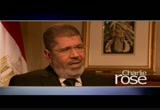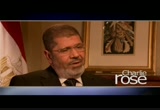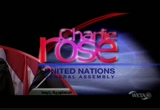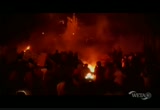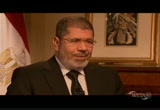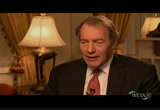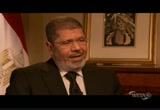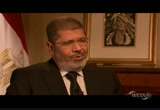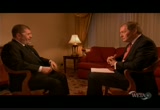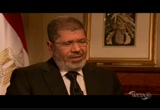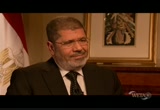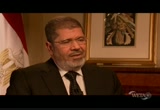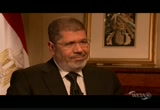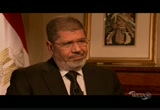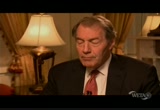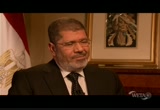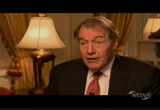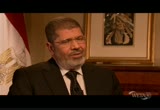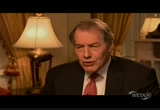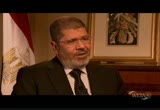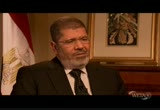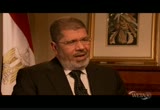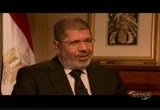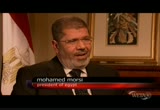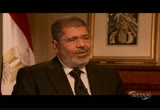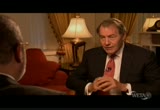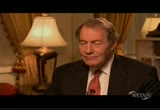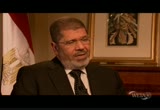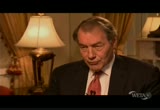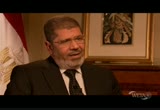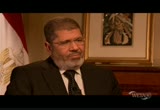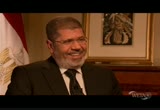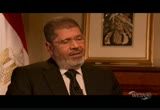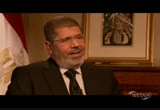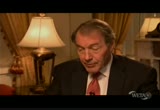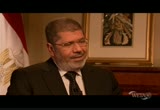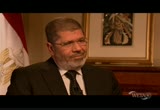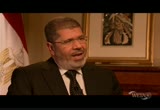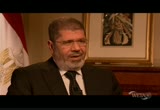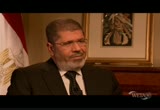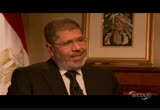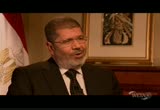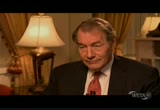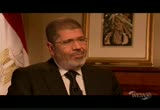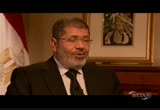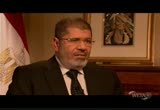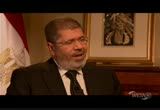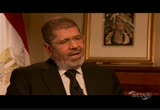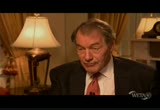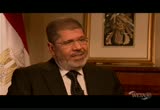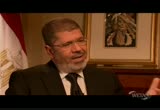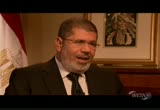tv Charlie Rose PBS September 25, 2012 12:00pm-1:00pm EDT
12:00 pm
>> rose: welcome to the program. to want, a conversation with mohamed morsi, the president of egypt. >> ( translated ): what happened in cairo was not something that was directed, aimed at the u.s. embassy as an attack, however, the u.s. embassy represents a symbol for the egyptians to express their-- they did not accept what happened from some of the citizens of the united states who offended the prophet mohammed-- peace be upon him. there was also somebody who
12:01 pm
wanted to burn the koran and this is something we do not accept at all. so the demonstrations were an expression of a high level of anger and a rejection of what is happening and the u.s. embassy represents the symbol of america as a people and government so people, the demonstrators, had a loud voice and as a government, it's our responsibility as the government of egypt we protected the embassy. we do not condone any attack against any embassies or any guests. this is a part of our principles and culture and what our religion orders us to do. >> rose: so the united states government and egyptian government are friends, not enemies? >> ( translated ): we are not enemies, of course.
12:02 pm
>> rose: you're our friends? >> ( translated ): for sure we are friends. >> rose: allies? >> the u.s. president said otherwise. >> rose: i know he did. but i'm asking the egyptian president. do you consider the united states an ally? >> ( translated ): this is depending on the definition of an ally. we have a real partnership in the interest and we want to achieve the interest of the world and to participate in many issues-- diplomatic, political, economical-- exchange of expertise in several areas. so the understanding of an ally as a part of a military alliance this is not existing right now. but if you mean by ally, partner
12:03 pm
12:04 pm
>> tonight a special edition of charlie rose. >> rose: mohamed morsi won an historic election this june to become the fifth president of egypt. he is the first civilian to hold this title. two years ago it would have been difficult to imagine a member of the muslim brotherhood leading the country. the history of the party has been defined by suppression but the arab spring transformed the political scene as protesters drove holmes out of power. the president inherits a tough
12:05 pm
breathe. morsi has had to deal with a military guard. he must gain the trust of minorities and work to overcome sectarianism and has also come to power in a time of increasing regional instability. in syria, the conflict between the government and free syrian army is settling into a long and bloody war. the middle east peace process in which egypt played a leading role has stalled as rhetoric heats up over iran's nuclear program, israel is increasingly isolated and most recently anti-american protests have sprung up in cairo and across the arab world, perhaps making a new arab cool relations with the west. mohamed morsi's days as a political prisoner of the mubarak regime are over but many challenges lie ahead. i spoke with him at his hotel during his visit to the united nations general assembly. here's that conversation. mr. president, thank you very much for taking time out of a very busy schedule, having just arrived in new york and welcome back to america. >> ( translated ): thank you very much. >> rose: what do you hope to accomplish here?
12:06 pm
>> ( translated ): first of all, i'd like to salute the viewers through this program in order to thank you for this interview and this opportunity and i'm not new or a stranger to the united states and the united states society. i lived when i was a young student between 1978 and '85 in the united states. these were student days and these were good days and my family was with me. i want the relationship between the two peoples of the united states and egypt to reach the highest levels of communication and love and respect. respect, mutual respect. this is a message that i want to be clear, very clear, for the
12:07 pm
egyptian people and they know that and they love this and for the american people. i hope that this visit is the beginning of a relationship of mutual respect and the relationship of not intervening in the affairs of the other party as well. >> rose: when you were a student at southern cal-- (laughs) -- did you ever imagine in a moment that you might become president of egypt? >> i was busy, very busy at the time studying and i was very much interested in political affairs and the situation in egypt and i always thought about the egyptian people and how i could benefit my nation and my country and i wanted to go back to my country as quickly as possible. the political work is an
12:08 pm
essential part of my life since i was young. i was-- i do not think at that time that i was going to be president of egypt. >> rose: what did you think you would be? >> i mean, my main job was the education in your city and research, scientific research. scientific expertise and worrying about the nation of egypt and the people of egypt and the education of the people of egypt and the changes i wanted to see that i wanted to see happen and a real, real development. that's what i was working for sr. through the brotherhood or outside the brotherhood. and also the political work. >> rose: it's a good time to have you help us understand what egypt has experienced. what you want us to know first about the arab spring and second
12:09 pm
about the muslim brotherhood and your governments. let me start with the arab spring. >> ( translated ): in reality the egyptian people are good people and reasonable people and very aware and they have an old and ancient history and i represented them with this march of democracy to achieve the general and the public freedom and the arab spring aims at reaching that goal so that people become free and the peoples are free and there are very real democratic process and there are-- there is a relationship with the rest of the world on the basis of peace and stability and the mutual benefits and the mutual respect between other peoples and the countries and the governments that represent these people. the arab spring expresses a real
12:10 pm
soul in the arabic nations, starting from tunisia, libya, egypt and now syria. and syria will reach a stability very soon with the will of the syrian people, god willing. >> rose: let me talk about syria then i'll come back to egypt. what's necessary to stop the killing in syria? >> ( translated ): the international community needs to cooperate in order to achieve this goal and in order to achieve a real goal by the people of the free will to support the people of syria in their march towards freedom because the killing and the bloodshed, these are crimes that are being committed right now and the world is watching it and we see this and this is something that keeps us away from sleep. we need cooperation between us.
12:11 pm
we have a quartet between egypt and iran, saudi arabia and turkey and with the help of the united nations and the countries of the free world i believe that we are getting close to a solution very soon. god willing. >> rose: what would that quartet do? egypt, iran, saudi arabia, turkey. >> ( translated ): well, you're talking about the countries that have influenced on the conflict right now in syria. the countries that i mentioned, egypt doesn't have any interest except for the interest of the people of syria to reach democracy and freedom. iran, however, is an influencing factor in syria and turkey as well and these countries. this country has different and
12:12 pm
separate roles and i tried through the egyptian initiative through the influential actors together based on the fact that saudi arabia represents the people-- the countries of the globe and they have a direct relationship with the-- so that it can become a nek lees you to an international and arab work in order to achieve a solution to this problem. >> rose: president assad has to go? >> ( translated ): i reiterate what i said before. there's no room for president assad to do anything but leave. there's nothing-- no room for what they call a political reform-- that change is what they need. what the people of syria wanted. and the-- the people of-- the
12:13 pm
will of the people of syria need to be respected. >> rose: if you cannot achieve that by negotiation, is force necessary to support the rebellion against the assad government? >> ( translated ): i'm against the foreign intervention by force in what happens in syria. i do not condone this and i think that it's a big mistake if it happens and i don't want to see this happen and i do not agree to this. egypt does not agree to this. however suppose what's most likely to happen is that this quartet with the cooperation of the international community and the great powers of the world they will solve the problem. >> rose: but most people believe that the other members of the
12:14 pm
quartet-- the turks and the saudis-- are supporting the free syrian army and the iranians are supporting the assad government. they're already sending weapons in. trate trait this is the reason why i chose these countries, because we cannot solve the problems away from those who intervene and the problem. those who intervene and who-- the stakeholders who are the ones who are willing to sit down together to solve the problem. >> rose: how would the process go? what would be the first step and second step to have an effective quartet achieve the results you would like to see? >> if we agree on the main principle which is to empower the people of syria become free to choose their leadership and have a democracy, if we agree on the principle, the working mechanisms will not be difficult
12:15 pm
but that will be possible. >> rose: the saudis have agreed? the iranians have agreed? and turkey has agreed? >> ( translated ): they agreed to meet. >> rose: when will the meeting take place? >> two meetings took place right now between the ministers of foreign affairs and their deputy ministers and we are seeking to hold a conference at the level of the head of state in the future. >> rose: will you demand a cease-fire? >> ( translated ): i would like to achieve and realize the will of the syrian people and to stop the bloodshed. the bloodshed leads to the killing of syrians from both sides. but who is the root cause of this problem? that's the dictatorship and the lack of democracy and the lack
12:16 pm
of public freedom. that's the main-- the directed cause for the revolution, the regime should have thought-- should have realized that the military solution would not stop the revolution, the bloodshed that took place and is taking this right now and tens of thousands of people are being killed right now and the number may be even higher until we stop this bloodshed. so the main goal right now is to stop this bloodshed. >> rose: and do those people who are supporting president assad, do they have a role? should they be included in the process? his own base of support? >> ( translated ): this is something that i would like to postpone to-- until after the bloodshed is stopped and then we talk about the change as a principle when the wise people in the world-- be it the quartet
12:17 pm
or the stakeholders in the area-- they have to realize that their relationship with syria in the future is going to be based on the syrian people in the first place. this is the meaning of freedom. >> rose: many people who want to see president assad go leave the country, worry about what comes next. do you worry about what comes next? because many forces have come into syria after the conflict started. >> rose: what happens after that is not easy but it's not impossible. we would like to provide the environment for the people of syria so their representative cans sit down together and we can help them to bring back their souls and their lives, normal lives, real lives and how the people can become able to
12:18 pm
choose the leadership and this is going to take some effort and some time. if we have good will and good intentions and we agree on the principles and the regime agrees to the will of the international community. when they meet this is not going to be impossible after that. >> rose: back to egypt many people have wondered what it would be like when you see a government in which the muslim brotherhood had won politically. what it would be like to have islamist governments in power in egypt. what should they expect? >> people in egypt made their choice, chose their way: freedom real democratic change, the stable political construction of
12:19 pm
the-- a country. the independence of the executive and legal branch and administrative branch. we are now working together on the constitution that will be presented to the people in the reference dumb if the people approve the constitution, the parliamentary elections will be held and the economic martial will be going to n parallel to this based on stability and a will of the people to build themselves, the people have decided and they are the ones who are going to be choosing their representatives as they chose the first parliament and they chose the egyptian president on the basis of awareness and will. after this great revolution in which all the egyptians took place, there is no household in egypt that did not have one of the members of the household at
12:20 pm
least who participated in the revolution. so the will of the egyptian people is clear and the path to stability is something that we all can see and we are adamant and keen on achieving stability for the people of egypt. >> rose: some say that the revolution was not started by the muslim brotherhood it was started, in fact, by an outpouring of people who were not almost political and their expression was for dignity and justice and respect. >> ( translated ): that's not true because the muslim brotherhood participated in the revolution in a very effective way. they were not the only ones but they were there since the beginning different levels. on the 25th of-- on the 28th, friday the 28th at the greater level and before that they have
12:21 pm
presented a lot of political worth and the regime has inflicted injustice on them for tens of years and this movement is going to be the natural movement and the real movement so that people can feel is there is injustice and there were possibility of elections in 2010 and before that. and the qualification we can see that only if there's an opposition to the regime, those who participated in the elections in 2010 were the muslim brotherhood the muslim brotherhood cannot say we did this alone. and they cannot say they were in the revolution since the beginning and right now i keep saying that as egyptians i am the president for all egyptians with all factions and with all kinds of parties and...
12:22 pm
>> rose: and all religions. >> ( translated ): they all have different-- and all religions. >> rose: because, as as you know, there's been conflict with respect to coptic christians. does that concern you? >> i don't see that there's a conflict between the egyptians based on faith, egyptians, muslims and non-muslims and specifically christians lived for thousands of years, hundreds of years together without any problems. there are differences between people in the society between muslims and other muslims and sometimes also between christians and other christians and sometimes christians and muslims and there are incidents over several tens of years. it's not something that points to a real conflict between
12:23 pm
muslims and christians in egypt. there are some incidents that were prepared or aimed at disrupting the country because the regime wants it to separate the people geographically in upper egypt in the north, in the south, in the west between christians and muslims, men and women. there is no main difference or conflict between the muslims and christians in egypt. all egyptians are equal in front of the law. and this is the-- what is happening right now or what i believe a personal responsibility for me as the president of egypt. >> rose: now, the prime minister of turkey came to cairo and made a speech and he talked about the significance of having a
12:24 pm
non-sectarian government. would you agree with him? >> ( translated ): we're talking about in egypt as the egyptian state, the national state democratic and constitutional and legal government. the principle or the understanding of the islamic nation is civil government it's not a theocratic government and it's not a secular government which means that the religion but people get confused, the principle of the middle age
12:25 pm
government or the understanding of the-- the islamic state. the islamic state is the civil state or government, people are confused in the principles but what we agreed to before the elections and after that all of the political parties agreed that this is a civil democratic and national constitutional modern government. the independence of the powers, the passing of authoritys is guaranteed, freedoms are guaranteed, the mechanisms to guarantee the democratic choices we all agreed on this and this is what we applied in the parliamentary elections and the last elections. >> rose: where does sharia law fit into all this?
12:26 pm
>> ( translated ): since 1923 the constitution of egypt which was made by egyptians, muslims and christians in the parliament the constitution committee in 1923, some of them were christians and they stated that the sharia is one of the principle sources of legal issues in egypt and even in the temporary constitution this is an article, this is-- this item is still there and the church approved this and everybody approved it because it possess it had necessary guarantees based on universal principles that are a part of the islamic
12:27 pm
sharia. and the details are in the laws. >> rose: there's a new constitution coming, though. >> of course. >> rose: you have said in an interview with the "new york times" in your other appearance with the media that the united states needed to change its approach to the arab world, showing greater respect for the values of the arab world and also show more interest in building a palestinian state. on the first, showing more respect for the values of the arab world means what? >> ( translated ): different people have different cultures. and the right to believe and the freedom of faith that have is something that needs to be respected for all human beings
12:28 pm
so the culture and the language and the belief are basic components over people who are living under one country when countries are built on these principles with these two-- all these countries, everybody must respect the specificities of the others. i stress-- i look at the american people and i say that there are some actions that took place in the past where there was a bias against the arabs and the muslims. it happened several times in the united nations by u.s.-- past u.s. administrations. now i see that there is a direction to-- by u.s. administrations to support the egyptian revolution and the revolution of the arab spring. there's an opportunity for the
12:29 pm
american people and egyptian people and other people to reflect on their-- how they see each other and they respect one another and they respect each other's religion and faith with multirespect. that's what i'm stressing. >> rose: you said that it's up to the united states to repair the relations with the arab world and revitalize the alliance with your words, i think, egypt, which is a cornerstone of the region. how do they repair the relations and what's the responsibility of the united states? >> ( translated ): it happened in the past decades, about four decades there's some kind of misunderstanding of several
12:30 pm
positions and, as i said, egyptians, egyptian p.m.c. the-- the blood of the palestinians being shed and they see that the u.s. administrations were biased against the interest of the palestinians so sort of hate and sort of worry arise out of that in egyptian-- and the area and-- however, as i said, this is an opportunity with the new directions of the u.s. administration, this is the opportunity to take these worries or this hate out of the way and to build a new relationship based on respect, communication and mutual respect. this is an opportunity so that egyptians can really see that there is a real support for their revolution, for their
12:31 pm
principles and for their choice by the american people and by the u.s. administration. this is a great opportunity for all of us to live together on the bases of international justice and international democracy, not just local democracy and freedom and local freedom. we want freedom for everybody. we sent a message of peace to everyone, but it has to be just as well. >> rose: we have seen in terms of the u.s./egyptian relationship protests at american embassies around the arab world and in cairo. some americans felt that you were slow to respond. were you slow to respond? >> not at all. what happened in cairo was not something that was directed, aimed at the u.s. embassy as an
12:32 pm
attack, however the u.s. embassy represents a symbol for the egyptians to express their-- they did not accept what happened from some of the citizens of the united states who offended the pro photomohammed-- peace be upon him. it was also somebody who wanted to burn the koran and this is something we do not accept at all. the demonstrations were of a high level of anger and egyptian of what is happening. and the u.s. embassy represents the symbol of america of people and government. so people, the demonstrators had a loud voice and as a government it's a responsibility as the government of egyptian we
12:33 pm
protected the embassy. we do not condone any attack against any embassies or any guest. this is a part of our principles in our culture and what our religion orders us to do. it keeps the safety of the guests for-- and the property-- same kind of property of egyptians and not egyptians. this is true and this is what's taking place and what took place. >> rose: so american embassies will be secure during protests-- not fro from protests but from violence. >> ( translated ): that is true, yes. from things that are taking place. egypt is a great country and a big country and has a great capability and is capable of
12:34 pm
safeguarding their guests and the organizations and establishments that come to egypt. egypt as a government and as an institution, as a group of institutions are capable of protecting those. >> rose: it's said that there was a heated, heated phone conversation between the president of egypt and the president of the united states. was there? >> ( translated ): it was warm, it was not hot. >> rose: okay. (laughs) what's the difference between warm and hot? >> it's the same difference between a friendship and being an enemy. >> rose: so the united states government and the egyptian government are friends, not enemies? >> rose: we are not enemies, of course. >> rose: but you're our friends.
12:35 pm
>> for sure. we're friends. >> rose: allies? >> ( translated ): the u.s. president said otherwise. >> rose: i know he did. but i'm asking the egyptian president. do you consider the united states an ally? >> this is dependent on the definition of an ally. we have a real partnership in interest and we want to achieve the interest of the world who participate in many issues, diplomatic, political, economical exchange of expertise and several areas the understanding of an ally as a part of the a military alliance that is not existing right now. but if you mean by ally, partner
12:36 pm
and special relationship and cooperation, we are that ally. >> rose: because egypt has a unique role--. >> ( translated ): i do not say that we are allies. >> rose: you said friends. >> ( translated ): i said friends and there are special a special diplomatic relationship and communication and political and commercial and scientific areas and an exchange of interests. we are-- there is strategic partnership between the two countries. >> rose: was american aid an issue in those conversations?
12:37 pm
>> ( translated ): no, that was not such at all. this thing was not mentioned. >> rose: so there was no cut off of american aid. >> there was no threat of any kind. >> rose: one of the things you have done is to change the army and its place and role in terms of two of the principal military figures in egypt who were there and central to a very difficult time in which the army did not oppose the events that were taking place. did you always intend to do that from the day that you were present? >> ( translated ): the egyptian armed forces are part of the egyptian people. the egyptian people love the armed forces and the armed forces had a great deal role to protect and guard the egyptian revolution and did not shed the
12:38 pm
blood of egyptians, they protected the egyptians,. if the entire world saw this and the armed forces did that and carried the elections free and transparent elections. the egyptian people love the armed forces and the armed forces-- and they stated during the transitional period that after it will civilian president is elected they will come back with all their force and they will go back to their bases to achieve their main role and concentrate on their role is which is to guard the supporters of the country. this is what the armed forces said several times what i is application, implementation of the will of the people of egypt
12:39 pm
and a decision of the leaders of as the armed forces during the transitional period the of more than 18 months. the armed forces promise that the transition period ends on 30 june, 2012 after the presidential election so it was normal that the decisions that were issued on the 12th of august were issued so that we can move into these t stable state and civil state and the armed forces are part of the civil state. >> rose: mubarak, president of tunisia, is qaddafi in libya, there are other monarchs in the arab world: saudi arabia, jordan royal family controls saudi arabia, there's a constitutional
12:40 pm
monarchy in jordan. are they going to be changed by the arab spring? will they lose their power as other authoritarian regimes have lost their power? >> ( translated ): the people that revolted against their leaders, against dictatorship were looking for freedom. the egyptians declared-- one of the children of egypt declared will will not intervene in the matters of other countries. we do not expert the revolution and will not intervene in other countries affairs. we support the people who want to achieve and reach their freedom as we are doing right now with the people of syria. however we do not intervene at all within the internal affairs of anyone and we do not want anyone to intervene.
12:41 pm
we want to keep our freedoms and we want the others to safeguard their own freedoms. >> rose: but would the natural expression of the arab spring by definition bring reform and change in bahrain? in saudi arabia? there n jordan? -- in jordan? >> ( translated ): i'd like to stress upon this fact once again this is something that is a matter of those people and those countries when i talk about the arab spring i'm talking about what happened, not what we can expect to happen in the future. the syrian people are fighting right now and in tunisia and libya it happens as well and it happens in yemen as well. so what i'm talking about, strongly, is what happened in egypt with the will of egyptians and what i love for other countries is that they achieve
12:42 pm
freedom and that they move towards the achievement of their own interests. so whoever accepts their leaders that's something that's a matter that comes back to them and if they don't want them, that's their preference. >> rose: there's a treaty between egypt and israel. what will happen to it? >> ( translated ): the treaty is there and stage. it's a founding state, a founding member of the united nations and we will continue even if we disagree with the rulers of egypt we respect-- we always said it would respect the international agreements and including the peace agreement. >> rose: the relationship with iran, do you believe iran has an intent to have nuclear weapons?
12:43 pm
>> ( translated ): the entire world is watching this. i'm not the only one. i cannot judge people by their intentions. >> rose: so what should the world do? what should the world do? >> ( translated ): not many countries in the world have a nuclear weapon and there are treaties, many treaties that prevent the owning-- owning w.m.d. and owning nuclear weapons, spreading nuclear weapons and there are treaties special to the middle east and everybody signed it and respect it in the middle east except for israel. >> rose: israel is not a signatory to the non-proliferation treaty. if iran had a nuclear capacity, the argument goes that a number
12:44 pm
of other countries in the region-- saudi arabia and others-- would immediately want to acquire nuclear weapons. do you believe this kind of proliferation would be a consequence? f iran gets nuclear weapons? >> ( translated ): i'm with the rights of people to use nuclear power for peaceful matters and i will do my best strongly so that egypt can have the capability to use nuclear power for peaceful means. however, nuclear weapons-- everybody knows, the world knows who has the nuclear power, the nuclear weapons and who used it before and who respects the treaties and who does not respect the treaties. i do not want a question to be
12:45 pm
posed or to pose a hypothetical question. >> rose: i don't understand whether or not you think iran wants nuclear weapons? do you believe they want the capacity to make nuclear weapons >> ( translated ): i don't have enough information about that. >> rose: do you support what the i.a.e.a. is doing? >> ( translated ): we have been doing that for years. >> rose: and you're supportive of that. when you look to egypt's role in the world, a new government of an old and great country fresh with the energy of a new time what role does it play in the
12:46 pm
region, in the world because many have always said because of the size of the army, the value of the culture, egypt has always been central. so what do you want to do with egypt's role? historic role? >> rose: what you said right now are all factors that suppress upon the fact that egypt the going to grow very fast to develop very fast and to-- it will become a country capable top compete with honor in the world and i look forward to a more stable future and a more effective future with international relationship with-- a special relationship with all the people, with all of
12:47 pm
the countries of the world. >> rose: what is it you exactly believe about the attack on american on september 11, 2001? >> ( translated ): i'm against this attack and i'm against the killing of innocent civilians and at that time i was a member of the muslim brotherhood we were the first institution in the world that issued a statement on the 12, the morning of the 12, september condemning this attack and the killing of innocent people. in the koran we're a verse that says if somebody kills an innocent life it is as if they killed the entire people of the world. we are against there and we do not accept this at all. the investigation-- this is the responsibility of the u.s. government and the u.s. officials. >> rose: so you believe it was carried out by those people were on a mission for al qaeda
12:48 pm
without any help anywhere else? >> ( translated ): in my life since then until now i condemn this act and i'm standing on the side of families and their children of those people who were killed in this tragic incident and i'm standing against those who committed these acts however i do not see any tribunal that was held in a clear way to decide for sure who did this and who helped who. i think that the u.s. government and its stable embrace and stable administration and government has a great
12:49 pm
capability. it can define somebody-- the responsibility lies with somebody that or the other-- to specify-- we saw after a few days-- after a few attacks. the decision was made to carry out a war against another country. and there was no tribunal that would help at that point and there was no clarification as to who did that in the mind of the world. i am not with those who did this. i'm against those who did this and i'm with the victims and i'm against the bloodshed of the innocent civilians this is clear since the beginning and i reiterate this. >> rose: but do you believe as
12:50 pm
osama bin laden took credit for that it was an operation carried out by al qaeda? >> ( translated ): we all heard in this in the media. this is something that become known to everybody that these groups climbed responsibility for these attacks and we condemned this and condemned what they did a and we condemned their declaration and this is something that cannot be accepted by anybody that anybody civilians are killed. we are against this. >> rose: okay, i hear your concern. >> rose: however i would like to clarify to you that what happened-- the aggressions that took place in iraq for those-- was not a justification in a clear way-- there was no
12:51 pm
justification by the u.s. government at that time. and this is what created confusion as far as this position. however the attacks themselves we continue to condemn them. >> rose: as well you should-- as well as you have. i'm aware of that. do you believe the united states-- the principle concern in the arab world about the united states comes from the absence of a palestinian/israeli peace, the afghanistan and the iraqi war and what else? what else is it that the united states has done that you believe must be rectified or put behind the united states in order to have the growing productive
12:52 pm
intelligent relationship with an arab world that's changing. >> ( translated ): and as an egyptian there's no animosity between us and the people of america this understanding does not exist. however the sensitivity and the worry that the egyptian people the middle east is because of some positions on past u.s. governments in matters that you mentioned with regard to the palestinians with what happened in iraq and in afghanistan. these matter in addition to that the bias of the u.s. administration against the will of the people in so many positions by supporting and
12:53 pm
looking the other way with regard to what these regimes are doing again they're supporting corruption, forging elections. people have seen that and they became insensitive to the point where it reached hatred hatred and the people do not distinguish between governments and people. this is where i reiterate that the position of the u.s. administration represents the will of the-- of the american people. this is a position that supports the arab spring so this this relationship can become warm and not hot. >> rose: is there a conflict between islam between sunni and shi'a that-- that's rell stroont this conversation?
12:54 pm
>> ( translated ): pleuralty of schools of thoughts and islam is something that always existed in history and is the contradictions or differences are not really differences in beliefs, but differences in understanding and implementation so these matters can be resolved and they do not lead to wars. >> rose: mr. president, thank you so much. it's a pleasure to have you and to see you again in the united states and look forward to the speech that you make to the united nations and look forward to visiting egypt again. thank you. >> ( translated ): and i thank you very much and i would like to take this opportunity to salute all of those who are
12:55 pm
listening to me in the united states or in the rest of the world, the entire world, and the people of egypt. my family as i am right now in the united nations to present the egyptian point of view as to what's happening in the world and i hope for peace and stability for the entire world. >> rose: thank you very much. captioning sponsored by rose communications captioned by media access group at wgbh access.wgbh.org
99 Views
IN COLLECTIONS
WETA (PBS) Television Archive
Television Archive  Television Archive News Search Service
Television Archive News Search Service 
Uploaded by TV Archive on

 Live Music Archive
Live Music Archive Librivox Free Audio
Librivox Free Audio Metropolitan Museum
Metropolitan Museum Cleveland Museum of Art
Cleveland Museum of Art Internet Arcade
Internet Arcade Console Living Room
Console Living Room Books to Borrow
Books to Borrow Open Library
Open Library TV News
TV News Understanding 9/11
Understanding 9/11
